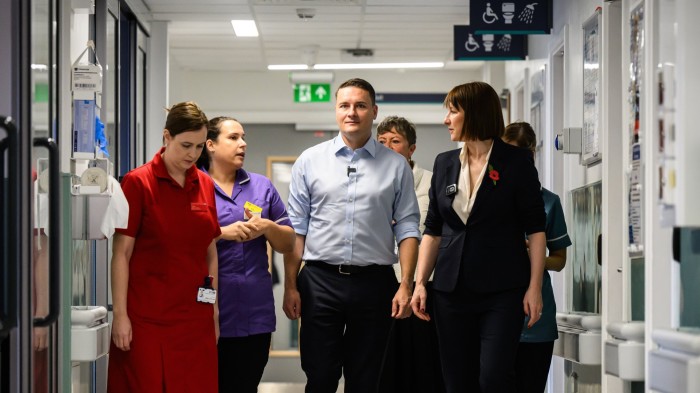
This article is an on-site version of our Inside Politics newsletter. Subscribers can sign up here to get the newsletter delivered every weekday. If you’re not a subscriber, you can still receive the newsletter free for 30 days
Good morning. Will league tables improve the NHS? Wes Streeting thinks so. Today’s newsletter weighs up the health secretary’s reform plans.
Inside Politics is edited by Georgina Quach. Read the previous edition of the newsletter here. Please send gossip, thoughts and feedback to [email protected]
The rest is yet to come
The big headline of Wes Streeting’s speech yesterday was his plan to improve health service outcomes by ranking individual NHS trusts in a public league table. It will give the top providers more freedom while those at the bottom will face targeted intervention and their leaders may well face the sack.
In some ways I think the league table part should be understood as a talking point: the NHS already has league tables of providers and the inspection results by the Care Quality Commission, an independent watchdog, are already publicly available. In practice, with a handful of exceptions, most of us are not going to be in a position where we are saying “quick! To the hospital! But to the Homerton not the Royal London as it has a better CQC report!” So many of the usual improvement mechanisms envisaged through the use of league tables are not going to really apply here.
But, as I say, “publishing league tables” is a thing that people generally understand and you can hold in your hand. It’s a good way of making the actually important thing that Streeting is doing tangible. That actually important thing? Changing the metrics by which NHS trusts will be ranked and judged: quality of the services offered to patients, financial management and senior leadership. (As it stands, turnover is the only metric that sets the pay of senior leaders.)
Streeting is determined to make sure that the NHS’s capital budget actually gets spent on capital, rather than being diverted into day to day spending, a persistent problem under the last government. He also wants to improve the quality and autonomy of NHS managers. As both Ara Darzi’s report into the NHS for Streeting and Sam Freedman and Rachel Wolf’s report for the IfG concluded, the NHS is actually “under-managed”: as a result a lot of clinicians’ time is used inefficiently and patient services are not as good as they could be.
I suspect too that this is part of why the NHS consistently spends less on capital and technological improvements. Put crudely, who is the person who decides to replace you with a machine? It’s your boss! Improving the quality of NHS management is partly about increasing the autonomy of NHS managers. But it will also inevitably involve the replacement of some people with other, better managers.
These are some of the big improvements that Streeting will hope his new and improved league table will secure. So far, this is very in keeping with the reform measures that the last Labour government implemented, but with one very important difference: Streeting is opting to keep NHS England, the 2012 invention of then-health secretary Andrew Lansley, in its place.
Is that the right call? Essentially, with the exception of Lansley, almost everyone involved in healthcare policy on the Conservative side thinks that the 2012 Health and Social Care Act was a mistake. Jeremy Hunt’s approach as secretary of state was to essentially ignore it, and had the pandemic not happened then Matt Hancock would have unpicked it. Another Conservative veteran of that time described it to me recently as “the biggest mistake” of David Cameron’s first term, while others have expressed their displeasure with it in fruitier terms. Darzi’s report was also highly critical of the changes.
Yet Labour does not (yet) propose to unpick them. There are good reasons not to do that, not least that the disruption of another big reform to the NHS’s organisational structures may not be worth the candle — or at least, not worth the candle this side of a general election. But it does mean the government is gambling that an NHS reform which almost nobody thinks worked can be made to produce the outcomes British people expect and Labour need to be re-elected.
How will a Trump presidency transform global trade and financial markets? The FT’s experts Alan Beattie, who writes the premium Trade Secrets newsletter, Andy Bounds and Brooke Masters will be sharing their predictions and answering reader questions over on this article later today — where you can write directly to them in the comments.
Now try this
This week I have mainly been nursing a sore foot (nothing too serious) and therefore I have been watching a lot more TV than I would usually: including the excellent sci-fi show Farscape, which is now on ITVX in the UK.
Top stories today
Pool party | Rachel Reeves is to legislate to develop eight pension “megafunds” as part of reforms to Britain’s fragmented local government retirement scheme that she claims could unlock £80bn of investment. She rejected more radical options including forcing pension funds to invest in British assets, or creating one single Canadian-style fund out of the UK’s £391bn local government pension scheme.
‘Slippery slope’ | Introducing assisted dying in England and Wales would divert NHS resources that could be used on other operations or services, the health secretary has warned.
Bon voyage | The government will keep a post-Brexit scheme to cut red tape for French children visiting on school trips after the programme was threatened by new requirements for EU travellers entering Britain.
Heavy handed? | Ministers have launched a review into how UK train operators handle suspected fare evasion, following “egregious” examples of passengers facing prosecution for minor ticketing errors.
How cuts to youth clubs affected teenagers | Analysis by Carmen Villa of the Institute for Fiscal Studies found the closure of youth clubs in the 2010s led to increased offending and worse GCSE results. The research estimates that for every £1 saved from closing youth clubs, there are societal costs of nearly £3.
Recommended newsletters for you
White House Watch — Your essential guide to what the 2024 election means for Washington and the world. Sign up here
One Must-Read — Remarkable journalism you won’t want to miss. Sign up here

